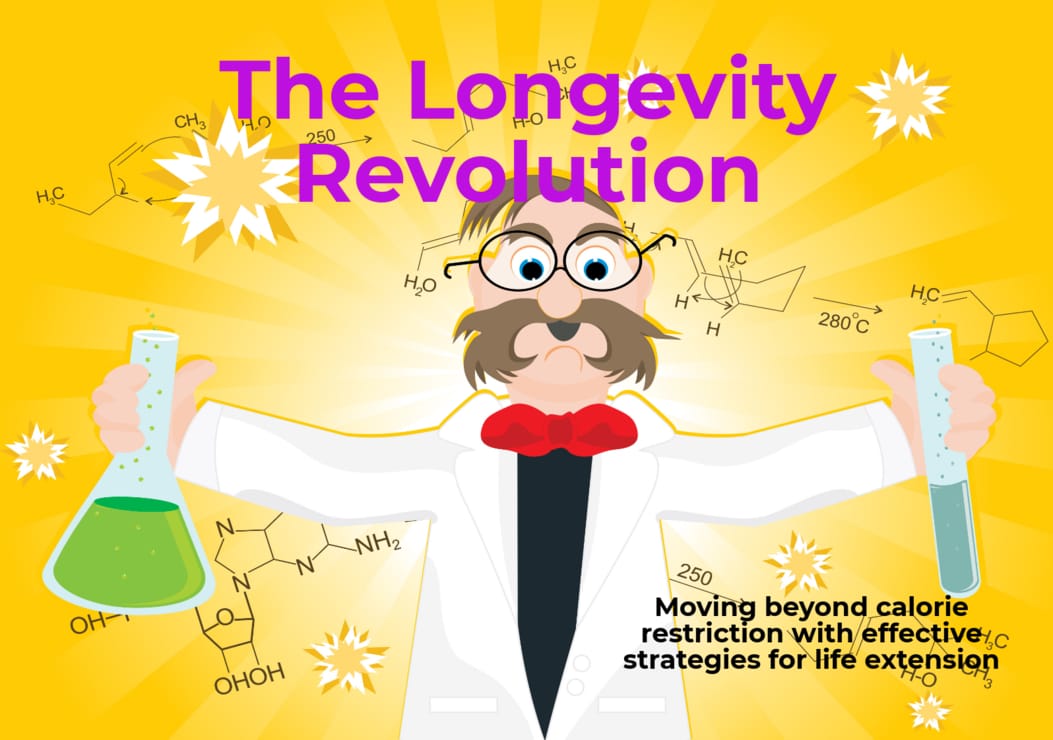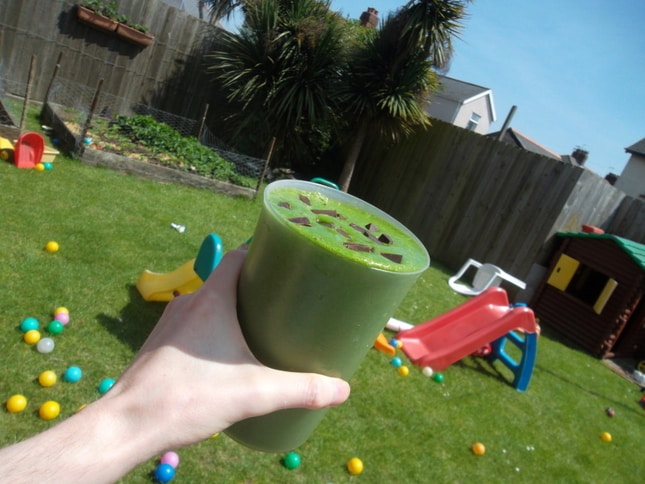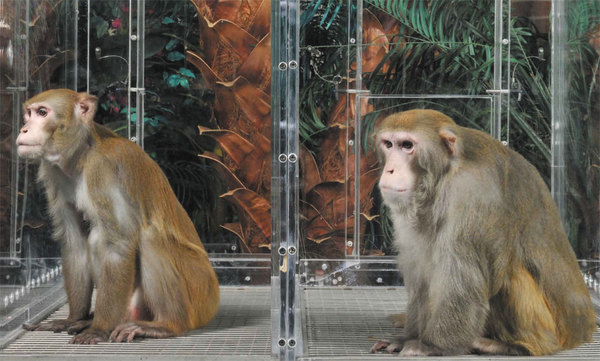Disclosure: This article may contain affiliate links. If you decide to make a purchase, I may make a small commission at no extra cost to you.
This study on calorie restriction in the grey mouse lemur primate came as a surprise. For 10-years, researchers at CNRS and the French National Museum of Natural History (MNHN), as well as other teams, were studying the effect of long-term caloric restriction starting from early adulthood.
Calorie restriction has long been known to reduce the risk of common diseases as well as extend maximum lifespan in a variety of species from worms, spiders, mice, dogs, and rhesus monkeys.
In recent years we’ve had two major studies published on the effect of the diet in rhesus monkeys showing that calorie restriction does affect healthspan and increase lifespan. However, results were mixed, and there were several issues with the studies which may have affected the outcome.
Calorie restriction drastically improves lifespan in small primates
Today, we have a much clearer result: calorie restriction drastically improves survival in the grey mouse lemur, a small primate, that were subjected to calorie restriction from early adulthood.
The researchers chose this primate because it has a similar physiology to humans, and therefore the results would be more likely to translate to humans.
They are a good candidate to study because of several reasons:
- They display age-related cognitive alternations like humans
- They develop declining motor function and sarcopenia
- They have changes in glucoregulatory function with age
- They have age-related changes in their immune system with age
- They have other age-related changes in their sensorial system and immune system
- They are genetically heterogeneous (diverse genetically, like humans).
The study design and what they ate
So at the start of the study in 2006, the scientists split up 36 male monkeys into two groups: one had their calories reduced by 30% and the other ate a normal diet.
The monkeys were given 15 grams of a mixture and 6 grams of fresh fruit per day, which was about 105kJ/day on average. The calorie restriction monkeys received 30% less and ate around 71 kJ/day on average.
Due to changes in food intake over time, the actual caloric reduction ended up being 24%.
Over time they were tracking several indicators of health and measured lifespan until their natural death.
Lifespan
By the cut off point of the study, none of the monkeys who were eating the standard control diet were alive. Whereas seven of the nineteen (37%) of the animals on calorie restriction were still alive and kicking.
Median survival for CR – 9.6 years
Median survival for Control – 6.4 years
The researchers noted that seven of the animals on calorie restriction far exceeded the maximum lifespan by reaching 13 years of age. The normal maximum lifespan in this colony was reported to have previously been 12 years.
The mortality rate from age-related diseases in the CR group was 60% lower than the control group. As you can see below (d), when they factored out deaths from other causes like accidents, around 60% of the monkeys are still living.
If you include all deaths, around one-third of the CR monkeys are still alive, while all the control monkeys are dead by this point.
Although, CR monkeys were more susceptible to non-age related deaths from accidents (head trauma), MRI anesthesia incidents, infections and other causes which were undetermined.
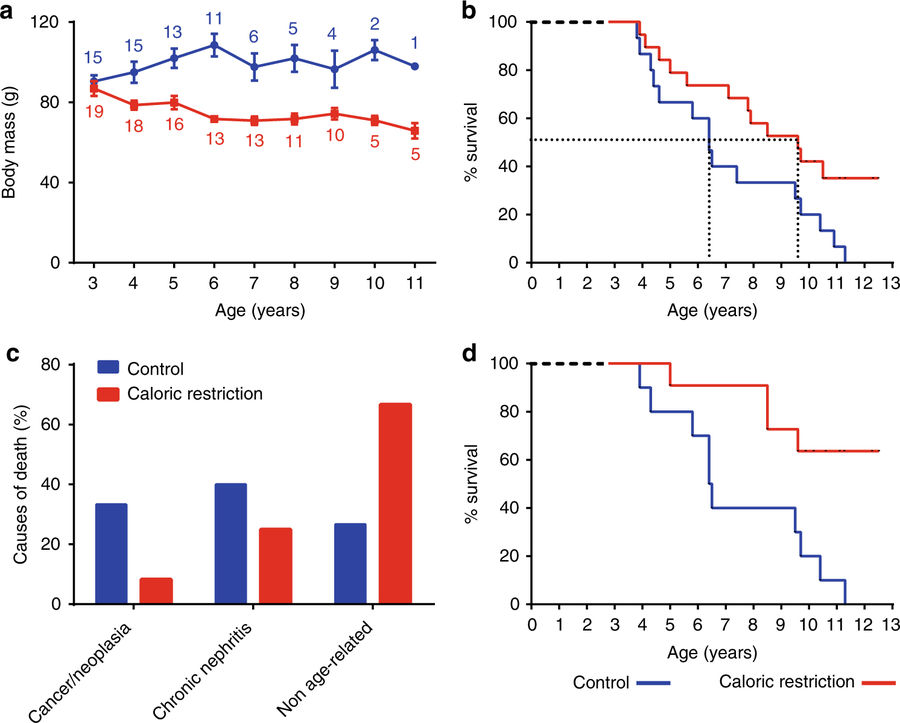
Brain results
In contrast with the studies on calorie in restriction in rhesus monkeys, the researchers observed that CR caused slight grey matter atrophy in several brain regions of the calorie-restricted monkeys.
However, one part of the brain not affected, and that was the genu of the corpus callosum. This is the part where the two hemispheres of the brain are connected together to communicate.
The researchers in the paper do not go into why grey matter in the brain of the CR monkeys was decreased.
Even though this effect was noted, it did not affect cognitive performance in the animals.
And some more good news: calorie restriction helped significantly slowed down and preserved the brain’s white matter in the monkeys on the diet.
Looking younger
One common theme in animals who are subjected to calorie restriction is that they appear to stay young-looking for longer.
The monkeys on the diet appeared to look years younger compared to ones eating a normal diet.
The CR monkeys had less whitening of their fur coat and the CR group were less likely to develop cataracts.
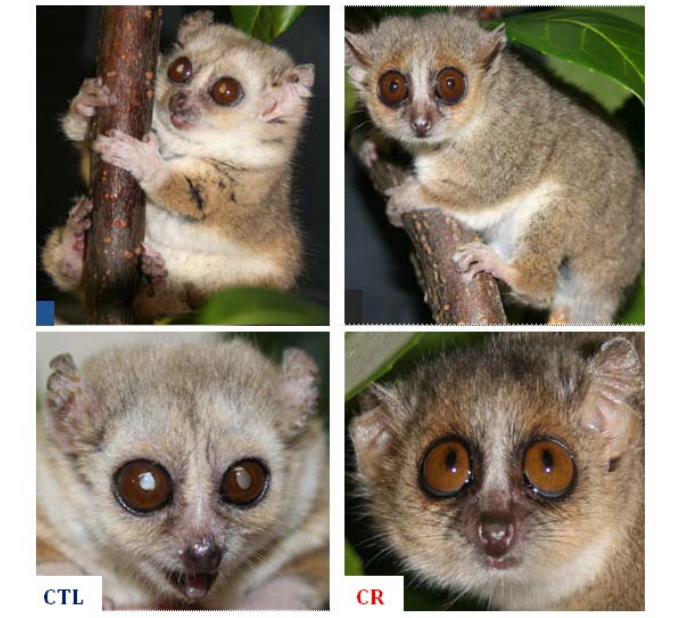
My final thoughts
Calorie restriction in animals presents a lot of challenges, as was apparent from earlier studies in rhesus monkeys. There are many things which can go wrong, which can affect the results/outcomes, especially when it comes to lifespan.
As already mentioned, the calorie restriction monkeys were more likely to suffer from accidental deaths and things that were not age-related. The same appeared to be true of the NIA and Wisconsin studies as well.
When looking at the results and translatability of CR in humans, we should consider the causes of death and the overall quality of the study.
In the other rhesus monkey studies,’ many of the monkeys died from gastric bloat due to overcooked food. They also had deaths from accidents, deaths from anesthesia, and deaths related to endometriosis.
To make it even more complicated, the monkeys spontaneously reduced the number of calories and even approached the same body weight in one of the studies.
But even with these problems, the CR monkeys were still healthier, and 6 of the 20 rhesus monkeys broke longevity records for their species by living longer than 40 years. And one rhesus monkey named Sherman was reported to have been 43 years old in 2017, while the average rhesus monkey lives to about 27.
Each animal model that calorie restriction is tried in has its positives and negatives. Due to compassion for the animals, non-interference (NIA rhesus monkey study) of medical conditions, accidents, among other reasons, it makes it more difficult to draw conclusions on the effect of CR on intrinsic aging.
Nevertheless, what we do know is that CR has a drastic impact on the diseases which are likely to kill humans: heart disease, stroke, cancer, diabetes etc.
In my opinion, it’s likely that calorie restriction will have a significant impact on aging and lifespan in humans when eating a healthy plant-based diet which is sufficient in vitamins and minerals.


